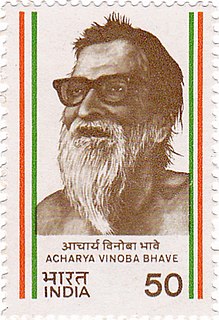A Quote by Vinoba Bhave
The natural movement of one's soul is upwards. But just as any object is dragged down when a heavy weight is tied to it, the burden of the body drags down the soul.
Related Quotes
The movement of the waves, of winds, of the earth is ever in the same lasting harmony. We do not stand on the beach and inquire of the ocean what was its movement of the past and what will be its movement of the future. We realize that the movement peculiar to its nature is eternal to its nature. The dancer of the future will be one whose body and soul have grown so harmoniously together that the natural language of that soul will have become the movement of the body.
It may be that what you could be haunts you. It is real. It is a weight you have to carry around. Each failure to become, to be, is a weight. Each state you could inhabit is a burden as heavy as any physical weight, but more so, because it weighs on your soul. It is the ghost of your possibilities hanging around your neck, an invisible albatros, potentials unknowingly murdered.
But let there be no misunderstanding: it is not that a real man, the object of knowledge, philosophical reflection or technological intervention, has been substituted for the soul, the illusion of theologians. The man described for us, whom we are invited to free, is already in himself the effect of a subjection more profound than himself. A 'soul' inhabits him and brings him to existence, which is itself a factor in the mastery that power exercises over the body. The soul is the effect and instrument of a political anatomy; the soul is the prison of the body.
Whatever his secret was, I have learnt one secret too, and namely: that the soul is but a manner of being - not a constant state - that any soul may be yours, if you find and follow its undulations. The hereafter may be the full ability of consciously living in any chosen soul, in any number of souls, all of them unconscious of their interchangeable burden.
While the body is young and fine, the soul blunders, but as the body grows old it attains its highest power. Again, every good soul uses mind; but no body can produce mind: for how should that which is without mind produce mind? Again, while the soul uses the body as an instrument, it is not in it; just as the engineer is not in his engines (although many engines move without being touched by any one).



































